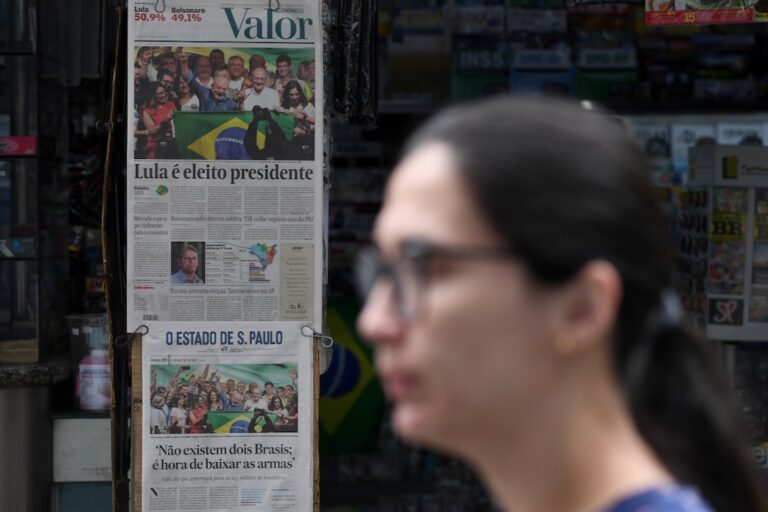(RSF/IFEX) – On 9 October 2002, RSF voiced its deep distress over the murder of journalist Sávio Brandão in the mid-western state of Mato Grosso and the presumed attack on journalist Felipe Santolia in the north-eastern state of Piaui. The organisation urged Justice Minister Paulo de Tarso Ramos Ribeiro to ensure that both cases are […]
(RSF/IFEX) – On 9 October 2002, RSF voiced its deep distress over the murder of journalist Sávio Brandão in the mid-western state of Mato Grosso and the presumed attack on journalist Felipe Santolia in the north-eastern state of Piaui. The organisation urged Justice Minister Paulo de Tarso Ramos Ribeiro to ensure that both cases are thoroughly investigated and, in particular, called for federal police to take part in the investigations.
“The participation of the federal police in these investigations is both legitimate and necessary,” RSF Secretary-General Robert Ménard said. As organised crime is suspected of being behind Brandão’s murder, it falls within the competence of the federal police, he stressed. In the second case, as Santolia was linked to the governor’s re-election campaign, Ménard recommended that the investigation should not be left solely to the civilian police, which is under the governor’s jurisdiction. He hailed the fact that the justice minister has already pledged the federal authorities’ support in the Brandão investigation and asked what form this would take.
In a report published on 3 October (available at www.rsf.org), RSF pointed out that in Brazil, which is a federation, “the murder of a journalist is exclusively a matter for the state judicial system, which is more susceptible to local pressure, and the civilian police, controlled by local elected officials (…) Three times better paid than their counterparts in the civilian and military police, federal police agents, in charge of investigating organised crime, are also better equipped and less tied to local political interests.” In the report’s conclusions, RSF called on the Brazilian authorities to adopt judicial reforms that would give the federal police the authority to investigate journalists’ murders.
The owner of “Folha do Estado”, a daily published in the Mato Grosso state capital of Cuiabá, Brandão was slain by two gunmen on a motorcycle on 30 September. The newspaper, for which Brandão himself wrote columns, had denounced the growing presence of organised crime in the region and had recently revealed the existence of an illegal network of slot machines. In its 1 October issue, the newspaper linked Brandão’s death to the “parallel power” he had denounced in his columns.
Brandão also owned a construction company and other news media, including the radio station Radio Cidade. The newspaper’s staff said he had not received any threats. A businessman and lawyer by training, Brandão had run several companies before investing in the media sector from the mid-1990s onwards.
As the police think the murder was committed by professionals, the federal justice minister has promised to provide the Mato Grosso state authorities with assistance in the struggle against organised crime, but he has not specified how. On 1 October, Military Police Lance Corporal Hércules Araújo Coutinho and Célio Alves de Souza, a former military police officer, were arrested for their presumed participation in the murder. The former was reportedly identified by witnesses as one of the killers. A ballistics report and fingerprints have also reportedly implicated him in the murder and linked him to five other killings in the region this year. He has denied any role in Brandão’s death.
Santolia, of Radio Chibata, a community radio station in Esperantina (Piaui), was found crucified to a tree on 5 October. His right hand was nailed to the tree, his left hand was tied with barbed wire, and he had been shot in the leg. He said that he was attacked and crucified by two masked men after they had flagged him down by the roadside, close to their vehicle, which had apparently broken down. According to Santolia, his assailants were on the point of returning with gasoline to burn him alive when passers-by saw him and intervened.
He blamed the attack on political opponents whom he had accused of corruption. Santolia had been campaigning for the right-wing Liberal Front Party (PFL) and had announced that he would release video recordings showing a rival party’s candidates for Parliament buying votes for the 6 October elections.
According to Agence France-Presse, the police lieutenant heading the investigation said the attack “may have been fabricated.” He said the police still did not have the video recordings Santolia had claimed to possess. He also said that, although not a candidate, Santolia had distributed leaflets carrying his own photo and the words, “Remove the corrupt from their throne and raise up the humble.” The police lieutenant reportedly added that, “it is strange, to say the least, that he was found crucified the next day.”
Local sources contacted by RSF said Santolia, a former seminary student, had always sought the limelight. However, Efrém Ribeiro, a reporter for the daily “O Globo”, has argued that the deep bullet wound in Santolia’s leg makes it less likely that his injuries were self-inflicted.


